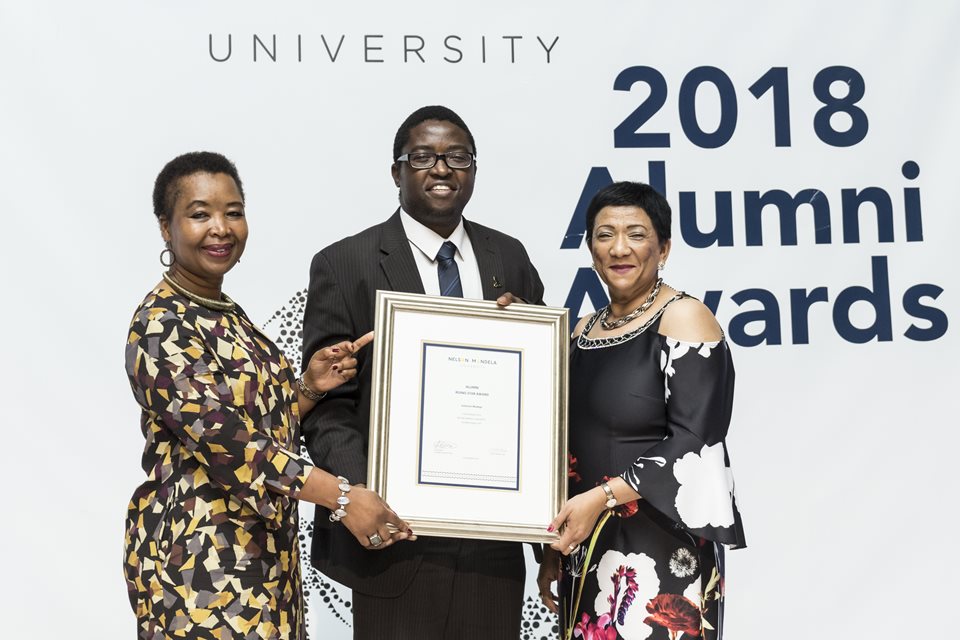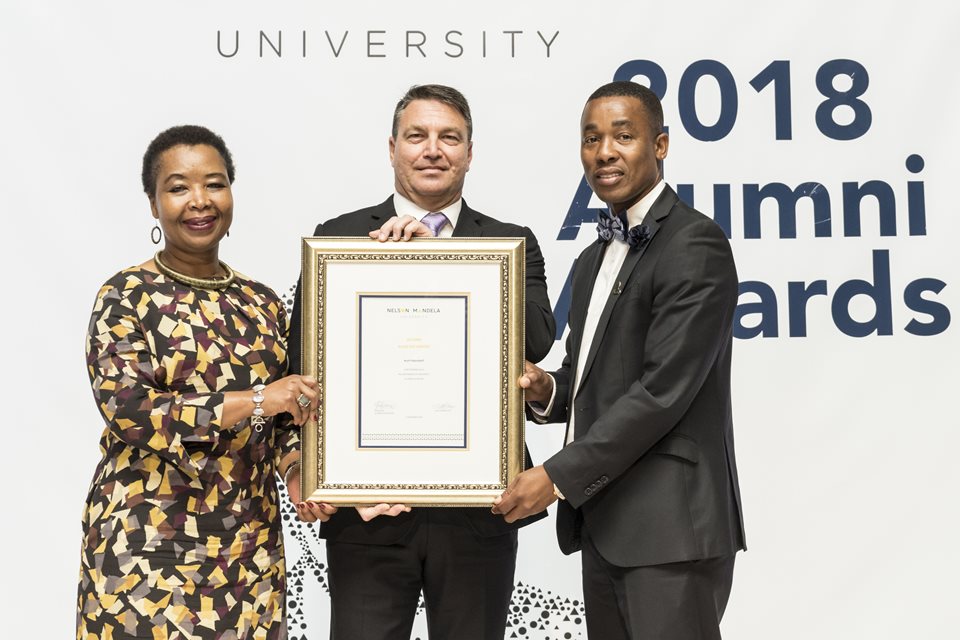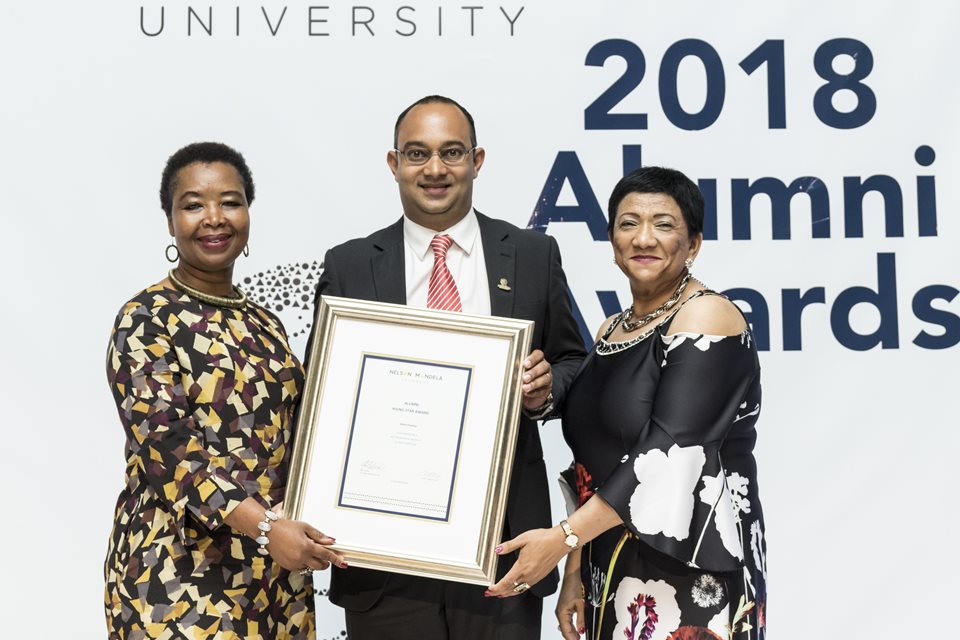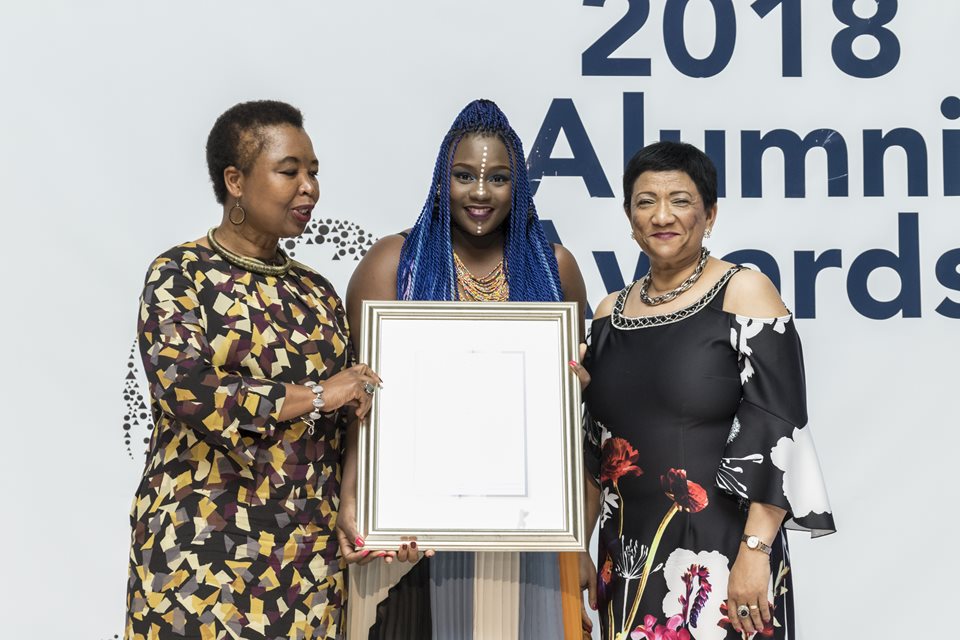While he was studying Brown ran his own computer business, selling computers, writing programmes doing anything you need from a computer point of view, getting entrepreneurial experience while getting his degree.
Brown didn’t choose cloud computing, as it wasn’t really known 10 years ago. In 2005 Amazon said “if we can run these large websites, is there any way we can offer services that will allow other companies to run their services on top of the Amazon data centres? We know how to run data centres, we know how to run computers to scale, couldn't we offer that as a service?”
Amazon sent one of their employees, a South African, back to Cape Town in 2005 and opened a software development centre in Constantia. No-one knew about it, it was a very small entity with 13 people in the team and from there developed cloud computing. The largest part of the ‘cloud' in terms of what Amazon invested in was built and developed out of Cape Town. “The Cape Town team is still driving a lot of the development around what we call our 'elastic' computer cloud, which is the service which allows you to have computer capacity. So that's how I got involved with cloud computing.
Brown’s advice to young people starting on a career path is to understand tech.
“Tech is everywhere and understanding tech is a requirement, it’s a good idea to have at least the basics - computer literacy, being able to use a computer and perhaps some basic computer programming so you can have a better idea of how a computer is programmed. Whatever you do today tech is such a fundamental part of it. What really helped me is do something that I’m passionate about. So many people either go after money or something else but if you really aren’t enjoying it, it is incredibly difficult to stay motivated. Passion is ultimately the reason for your success in your career. Have very clear, focused goals.”
Brown adds that although the going will be tough it's about having the grit to stay focused and push through as, people often push being comfortable rather than achieving their goals.
From football to FIFA HQ (Published November 2018)

Rising Star awardee and proud Mandela University alumnus, Zimbabwean-born Solomon Mudege certainly lives up to the award in the 13 years since he first graduated with BCom HMS: Sport & Recreation in 2005, to promotion to FIFA Senior Development Manager, which heachieved earlier in 2018.
Mudege is also an MA Human Movement Science and FIFA/CIES/Nelson Mandela University Programme Sport Management graduate, which is an International Master in Management, Law and Humanities of Sport (MA) that must be completed at three international universities: De Montfort University in Leicester (UK), SDA Bocconi School of Management in Milan (Italy) and the University of Neuchâtel (Switzerland).
Like most boys growing up in Zimbabwe, Mudege’s passion was playing football at school and in more structured settings, but when he realised that he was not going to play football professionally he decided that a career in sports management seemed an acceptable compromise.
“I studied Sport and Recreation Management at undergraduate level, Business Management at Honours and then did research on talent development in football for my Master’s degree in Human Movement Science. I wanted a holistic appreciation of sport management and my qualifications at Nelson Mandela University allowed me to achieve that.”
Mudege says that he realised there was more to football and sport than just playing the game and was aware that sport management is a viable career and tried to prepare for it.
“I watched global sport events and could see that there was a lot of preparation and organisation that went into delivering the sport event. I also realised that there were a range of languages used in international sport. One of my earliest memories of the FIFA World Cup was listening to the Cameroon players being interviewed in French at the 1990 FIFA World Cup in Italy. I was fascinated, so when I was in high school, I studied French as one of my subjects and I am now comfortable working in French as well.”
Upon graduating Mudege began his career working for FIFA in Switzerland, starting as FIFA Master Trainee, followed by the FIFA Marketing Alliances Manager and now Senior Development Manager.
He explains what it means to be a FIFA Master Trainee; “After graduation from the FIFA Master in July 2010, I was selected to work in four FIFA divisions on rotation, mainly delivering event processes and content management. It was a great opportunity to ‘learn on the job’ at FIFA for a year and I was glad to be offered a permanent job following my internship.”
It was an intense year rotating in the Event Management Department (FIFA Competitions), Marketing Communications and Research Department (FIFA Marketing), Broadcaster Servicing Department (FIFA TV) and the Development Programmes Department (FIFA Member Associations & Development).
As Senior Development Manager, Mudege only focuses on development programmes in Africa now. However, the sub-division that he works in handles development programmes in both Africa and the Caribbean.
He is also responsible for supporting the Confederation of African Football in planning and implementing football development activities on the continent with FIFA funding of USD 10 million a year and ensuring compliance processes for FIFA support that is provided to the African member associations for the FIFA FORWARD projects which avails USD 5 million over a four-year period to each member association.
Such an impressive career path doesn’t come without challenges, even if it sounds like many a young boys’ dream of mingling with international soccer stars. “I definitely did not jump into my dream job. There were challenges and hurdles. Looking back, whatever obstacles I faced were important to get me to where I am today. I still face challenges in various aspects today and they will benefit me in the future as well.”
Mudege says that managing the FIFA development programmes in Africa and the Caribbean are an ‘immense’ honour. “It is very rewarding to see how I am contributing to football development of diverse countries such as Djibouti, Egypt, Gambia and South Africa.”
Ubuntu means a great deal to Mudege and he encourages alumni to look for opportunities to be involved with the university and sharing their experiences and expertise related to their current positions as well as giving back and developing other students.
“I am a regular lecturer on the Nelson Mandela University/FIFA/CIES Executive Programme in Sport Management and I come to PE at least once a year to assist the programme. I have also presented lectures for other departments as well, such as on Business Management.
“Since 2015, I have managed a scholarship (The Bester Award – named after my late mother) which assists selected female candidates to pay for their tuition for the Nelson Mandela University/FIFA/CIES Executive Programme in Sport Management. I also run an annual auction with each edition of the qualification to raise funds to buy sports equipment for local schools/clubs.”
Mudege’s advice for aspiring graduates is to encourage them to look for opportunities to practically apply what they learn in the classroom – while they are still studying. “While studying for my Sport Management degree, I also set-up and managed the website for our Campus Residence League. It provided me with work experiences that are still valuable today.”
Make things happen (Published November 2018)
 Seasoned international business and legal executive and strategist, Kurt Pakendorf believes in making things happen. He graduated from Nelson Mandela University with BProc (1991) and is currently the Chief Strategy Officer and General Counsel for Face IT Limited in London, UK and California, USA.
Seasoned international business and legal executive and strategist, Kurt Pakendorf believes in making things happen. He graduated from Nelson Mandela University with BProc (1991) and is currently the Chief Strategy Officer and General Counsel for Face IT Limited in London, UK and California, USA.
“Making things happen - I actually do believe in that and that it also plays to what my role is right now. I'm 20 years older than the founders that I work with - so I work with millennials. My role here is that I'm the general councillor of the company and also the chief strategy officer. If you see how the chief strategy officer role plays out in companies, particularly in a tech company they are looking strategically where your technology should be, in other words; where should their platform be growing and what they should be delivering on.
“The other kind of chief strategist, which is more of what I am, is understanding where there is a strategic mission that needs to be delivered on. If we fail to delivery on this the company might fail or would be less likely to succeed or enable an environment where you make sure those obstacles are removed and that the strategic goal is met. My job is to facilitate to make sure that obstacles are removed and objectives met and, in that context, I literally make things happen here.
Since leaving Nelson Mandela University nearly 20 years ago, Pakendorf has worn many hats in his career - follower, naval officer, attorney, general counsel (chief legal officer) United Nations official, manager, founder, consultant, COO, CEO and business development, and, is well positioned to lead and deliver on multidisciplinary and multijurisdictional roles and projects.
Pakendorf has taken skills from all his work experience including languages he learnt in countries he worked in, including Serbo-Croatian which paved a way for him to work as a legal officer at the United Nations Interim Administration Missions in Kosovo.
“The fact that I speak Serbo-Croatian was important to working at the UN in Kosovo. This kind of mission hadn’t been done before, no-one knew whether it would become a country or not. It was most rewarding helping setting up banking, supplying fuel for civilians, setting up legislation on how to open the airport, which was then under military rule. Kosovo was in a post conflict zone but still quite dangerous at the time.”
Pakendorf then worked his way to becoming CEO and director of MobileWave Group plc in London and the vice president and general counsel at Havok.com Inc. in the USA. He also co-authored the UK Current Law Statutes and Petroleum Law 1998.
He also led and negotiated the establishment of one of the world’s Counter Strike: Global Offensive professional eSports league with 20 teams and US$3.5million in prize money. He is also
the director of Esports Championship Series CS Limited London and the founder, director and co-owner of Anicus Law Limited, which is a boutique international legal services firm offering legal and strategic business consulting services.
Pakendorf is the co-founder and a managing partner of The Sable Accelerator, which is a trusted expert network of expatriate South Africans giving back to their country in different forms.
“We decided to found The Sable Accelerator because we realised that there were a lot of South African expats with global skills, expertise, knowledge, connections and influence living in the US and UK and there are South African entrepreneurs, new venture start-ups, academic institutions, and companies looking to commercialise technology innovations, promote and protect intellectual property, fund new business concepts, finance growth, as well as expand into global markets.
“Why not pull together these two groups of South Africans, expose them to each other and help make a difference. These types of interactions can be beneficial to both sides and to South Africa, and Africa, as a whole. We’ve just had the Premier of the Eastern Cape and his delegation at our San Jose, California, office for consultations and introductions, and recently executive MBAs from the Gordon Institute of Business Science at the University of Pretoria were there.”
Pakendorf says that if he could start his career over, he would be more patient as he was in such a rush to start working that he took the quickest route open to him. “I wish I’d spent more time at university getting an LLB versus my BProc.” He was already an articled clerk at a law firm while at university so he was able to make a quick transition as a lawyer, passing his article exams and degree around the same time.
“My advice to students is that you will never have this time again, don’t waste it. There will be more than enough time later to focus on getting your career launched.”
Onwards and upwards for SA’s head of e-mobility (Published November 2018)

From small beginnings working alongside his father in the automotive industry, Hiten Parmar is now leading the automotive technology landscape in South Africa.
Parmar’s fascination with electronics inspired his studies in electrical engineering at Nelson Mandela University, paving the way towards his position as director of South Africa’s national uYilo e-Mobility Technology Innovation Programme – which is working to expand the country’s electric mobility industry.
It’s a role which sees him collaborating with multiple stakeholders across the public and private sector both locally and abroad, as he works to mobilise government buy-in at all levels, original equipment manufacturers (OEM) product and infrastructure support, business development and thought leadership.
Recognised as a leading expert in a pioneering, low-carbon industry, Parmar, 36, has been awarded a Rising Star alumni award from his alma mater Nelson Mandela University (on 23 November).
Parmar studied electrical engineering to master’s level, graduating in 2011, and went on to obtain his Honours in Business Administration in 2016.
His career in the automotive industry – in academia as well as public and private sectors – spans 14 years, and includes Volkswagen and BC Automation in South Africa, along with the University of Applied Sciences Wolfsburg, in Germany.
His areas of expertise include advanced manufacturing and automation, research and development, engineering, motorsport, electric vehicles and smart grid technologies.
In a time where countries are shifting away from their reliance on fossil fuels towards climate-smarter options, Parmar believes uYilo has a key role to play.
“Traditional modes of mobility technologies – namely , petrol and diesel – have led to increased air pollution that has negatively impacted air quality for citizens all over the world. Breathing air in Delhi, India is said to be equivalent to smoking 44 cigarettes a day.
“In South Africa, the national Department of Transport indicates that across the overall transport sector, road transport emissions equate to 91.2% of direct emissions, particularly from the combustion of petrol and diesel.
“My passion is to contribute to advancements within the automotive industries globally through the deployment of technological interventions to solve major economic, societal, and competitiveness challenges.”
Parmar’s combined knowledge of automotive principles together with electrical technologies has given him a unique skillset. “The current portfolio of the national uYilo eMobility Programme extends towards a large stakeholder network which includes ministerial engagements, CEOs of multinational corporations, entrepreneurs and start-up companies as well as students.”
Parmar said he was humbled to receive the Rising Star award. "It serves as recognition of achievement by an individual under the age of 45, towards significant progress in their career field."
Mandela University recognises EC singing sensation (Published November 2018)
 Mthatha-born singer and songwriter Amanda Benedicta Antony – better known by her stage name, Amanda Black – grew up pursuing one dream only: to be a famous singer.
Mthatha-born singer and songwriter Amanda Benedicta Antony – better known by her stage name, Amanda Black – grew up pursuing one dream only: to be a famous singer.
The 25-year-old spent her childhood entering school talent shows and competitions – but it was her third entry to SA Idols in 2015 that ultimately led to her success.
The Afro Soul star, who made it to the final seven of Idols’ season 11 and whose debut album “Amazulu” went platinum just three weeks after its 2016 release, has been awarded a prestigious Rising Star alumni award by her alma mater Nelson Mandela University, where she graduated with a National Diploma in Music in 2015.
“It is an honour to be receiving this prestigious award. It means all the hard work has not been in vain,” said Black.
The singer pursued tertiary studies “because my mother wanted me to have a plan B”. “I chose music because all I wanted to do was sing.” Black, who was the season 11 fans’ favourite, said although she was disappointed not to win Idols, she gained invaluable experience. “My journey has been filled with hard work and blessings. Timing is everything. I learned that I wasn’t meant to win Idols even though I wanted to, but I was meant to be there, because I learned a lot about who I wanted to be, and who I was as an artist.
“Being eliminated taught me the importance of perseverance and persistence. I also learnt about the huge impact and power that social media has on the industry.”
Her hit single "Amazulu", meaning “the Heavens” and written in her Xhosa dialect, was nominated for several South African and international music awards – and earned her two Metro FM awards, four South African Music Awards and nearly three million views on YouTube. “My album Amazulu was about my journey. The songs are my stories. They are honest.”
Commenting on her future goals, she said: “My hopes for my career going forward are that my music and message reach more people and heal and touch people’s lives on a global scale.
“One of the challenges is remaining true to my journey and goals. Sometimes we get distracted by situations and lose sight of why we’re doing the things we do and why we walk the paths we walk, but home and family always make it clear for me and keep me grounded … We should never forget who we are and where we come from, and especially where we’re going.” Black is known for the Xhosa art patterns she wears on her face.
“The Xhosa facial art that I wear has quickly become part of my brand as Amanda Black. But it started as a way of expressing myself and embracing who I am. For me, it’s taking back my culture as a Xhosa woman – and feeling beautiful while doing it. It’s about me living the way I understand my culture to be. It’s a way of representing my roots and where I am from."